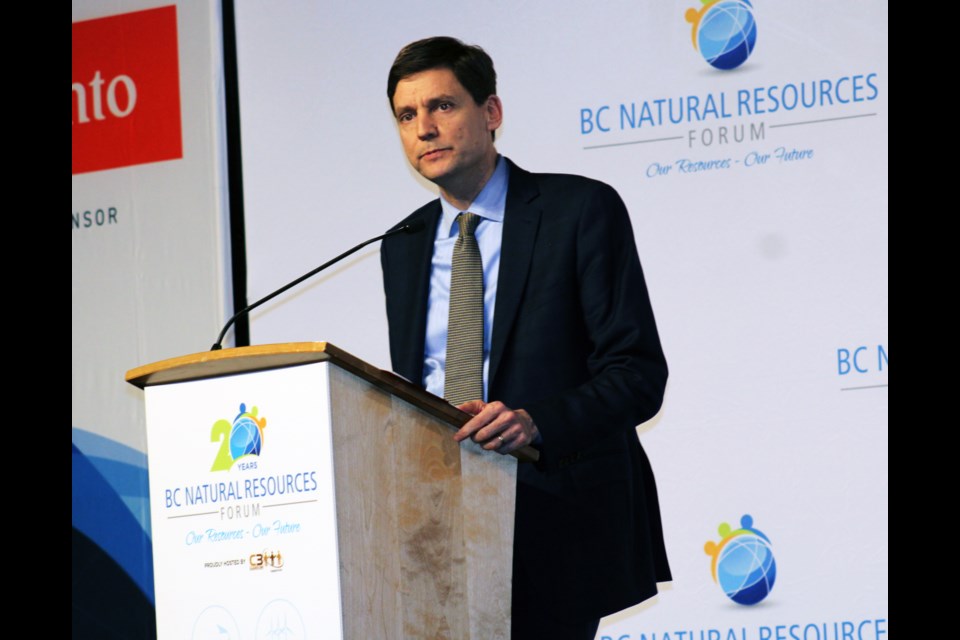When introducing David Eby as the keynote speaker to kick off the BC Natural Resources Forum Tuesday night, Artemis Gold chairman/CEO Steven Dean took a friendly prod at the B.C. premier, asking for him to speed up the lengthy permitting process so he start building his gold mine south of Vanderhoof.
Eby’s answer came not long into his speech when he told the audience he intends to bring the same one-stop approach to processing natural resource projects permits that he revealed Monday in his Permitting Strategy For Housing plan.
“While our announcement yesterday of a one-stop shop application approach for housing, with more than 40 new staff who will take the pressure off our overheated system, may not have seemed directly related to the people in this room, it is,” said Eby.
“These staff will help address the backlogs not just in housing, but in mining and forestry. The one-stop window will be the template designed in housing that we will bring over to the natural resources sector with the lessons we learn. Addressing the permitting costs and delay that our overloaded and complicated system can bring, is a priority for our government,” he said.
Eby spoke of the importance of engaging with First Nations governments to get them on board with resource projects in their traditional territories and reduce the time it takes for companies to earn their approval.
“Together, we will find a path to a fair, transparent, and timelier process to cope with demand,” Eby said. “Other governments have tried in the past to fix this problem. But the solutions implemented simply didn’t work. We can learn from those lessons.”
He said businesses that embrace environmental, social and governance obligations are more likely to find high-quality employees, attract loyal customers and raise capital for their major projects.
Eby pointed to the consent-based agreement between the Tahltan Central Government and the provincial government reached in June on the proposed gold/silver mine at Eskay Creek, northwest of Stewart, which established a model for future land use agreements to meet sustainable mining and environmental standards.
“Partnerships and co-management are the way of the future,” said Eby. “This is a major paradigm shift, the effects of which are being felt on the ground. But it is a shift that is necessary. Both to address the legal rights, interests and concerns of Indigenous rights holders, and to provide greater certainty to the use of land and resources.”
While reminding his audience how vital resource-based industries are to the overall prosperity of the province, Eby pointed to the seven new mining projects proposed for B.C., including Blackwater Gold, which he said represents an investment of $4 billion.
Hydrogen as a clean energy source will play a prominent role in B.C.’s future economy with 40 new projects or proposals worth $4.8 billion announced since the province announced its hydrogen strategy less than two years ago.
“We are already a world leader thanks to B.C.’s clean electricity, abundant natural resources, and innovative companies,” said Eby. “You’re seeing that right here in Prince George as Hydra Energy builds the world’s largest hydrogen refueling station.
“We are well positioned to grab a significant share of the global hydrogen market, as B.C. ports can service Japan, South Korea and the Pacific Northwest.”
As for the reeling forest sector, Eby pointed to the $185 million the province budgeted and the $90 million BC Manufacturing Jobs Fund he introduced earlier in the day as examples of how the government is helping forestry companies workers worried about their futures in forestry, especially those affected by Canfor’s Prince George Pulp and Paper mill closure.
“It is devastating to the workers and their families, who have worked so hard over the years to make that mill a success,” Eby said. “Rapid response teams are working with the community. Ministry staff will ensure people can access programs and supports.
“That help includes creating jobs through the Forest Employment Program and training for workers who want to upgrade their skills. This is a difficult time, but I know Prince George is strong — and I would never bet against this city.”



